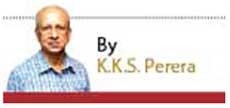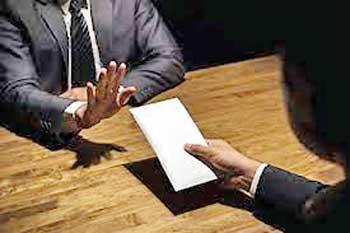Reply To:
Name - Reply Comment
 It is estimated that only one out of 12,000 corrupt deals gets exposed when a victim musters the rare courage to make a complaint. This alarming statistic indicates that existing statutes, acts, decrees, laws, and regulations have played an insignificant role in curbing corruption. Sadly, legislators are well aware of this fact. During a recent debate on corruption in the House, a government member who had crossed over from the opposition was caught smuggling gold biscuits but continued to enjoy all the privileges of being an MP. This blatant display of misconduct demonstrates the shamelessness with which corruption persists in the country.
It is estimated that only one out of 12,000 corrupt deals gets exposed when a victim musters the rare courage to make a complaint. This alarming statistic indicates that existing statutes, acts, decrees, laws, and regulations have played an insignificant role in curbing corruption. Sadly, legislators are well aware of this fact. During a recent debate on corruption in the House, a government member who had crossed over from the opposition was caught smuggling gold biscuits but continued to enjoy all the privileges of being an MP. This blatant display of misconduct demonstrates the shamelessness with which corruption persists in the country.
 Two senior politicians, holding important positions in the government and the opposition, occupy the front benches of Parliament. The government representative, the SLPP man was convicted of demanding a bribe from a foreign investor, but his sentence was suspended due to poor health. The opposition member, during a cabinet reshuffle, agreed to take the position of Higher Education Minister instead of Highways Minister, but with the condition that he be given a section of a highway under construction. These instances further illustrate the involvement of high-ranking politicians in corrupt practices. As Daily Mirror reported, [02/06/2016] the JVP Leader Anura Kumara accused the same prominent parliamentarian of appointing over 100 coordinators and advisors to his ministry from his electorate through RDA, each costing a significant amount. This nepotism and misuse of public funds illustrate the deep-rooted nature of corruption within government institutions.
Two senior politicians, holding important positions in the government and the opposition, occupy the front benches of Parliament. The government representative, the SLPP man was convicted of demanding a bribe from a foreign investor, but his sentence was suspended due to poor health. The opposition member, during a cabinet reshuffle, agreed to take the position of Higher Education Minister instead of Highways Minister, but with the condition that he be given a section of a highway under construction. These instances further illustrate the involvement of high-ranking politicians in corrupt practices. As Daily Mirror reported, [02/06/2016] the JVP Leader Anura Kumara accused the same prominent parliamentarian of appointing over 100 coordinators and advisors to his ministry from his electorate through RDA, each costing a significant amount. This nepotism and misuse of public funds illustrate the deep-rooted nature of corruption within government institutions.
Anura Daniel, a Member of Parliament from the UNP was caught smuggling gold bars. As a result, he was compelled to resign from his seat on April 18, 1982. Surprisingly, Anura’s sister, Rupa Daniel, was appointed as his replacement by President J.R. Jayewardene. In a subsequent turn of events, during the 1989 elections, Anura Daniel, the former gold smuggler, made a political comeback. He was nominated by President R. Premadasa to contest the Kandy District, demonstrating a concerning trend of individuals with a history of corruption being reintroduced into political positions.
Bribery and corruption remain persistent issues in many societies, including Sri Lanka. Despite the existence of legal statutes and initiatives, the effectiveness of these measures is often hampered by weak enforcement and systemic challenges.
This was Sri Lanka’s first legislation addressing bribery and corruption, laying the foundation for subsequent enactments. The Bribery Act of 1954: This act aimed to prevent and punish acts of bribery and corruption, establishing the Bribery Department for investigation and prosecution. The Bribery (Amendment) Act No. 19 of 1994: This amendment established the Commission to Investigate Allegations of Bribery or Corruption, replacing the old Bribery Department. Its purpose was to strengthen the institutional framework for combating corruption.
|
Bribery and corruption remain persistent issues in many societies, including Sri Lanka. Despite the existence of legal statutes and initiatives, the effectiveness of these measures is often hampered by weak enforcement and systemic challenges ------------------------------------ Corruption involving parliamentarians in Sri Lanka has a long-standing history. The earliest recorded incident dates back to the 1940s when several State Councillors were investigated for bribery |
Proposed Independent Commission of Inquiry on Bribery and Corruption: Minister Wijeyadasa Rajapakshe proposed the establishment of an independent commission accountable to Parliament to address bribery and corruption. This initiative sought to provide more effective measures and oversight in combating corruption. The proposed amendments and new acts aim to enhance anti-corruption efforts. Earlier there was no provision for accurate monitoring of asset declarations, coverage of immediate family members of declarants, protection of whistle-blowers, witnesses, and victims, as well as addressing sexual harassment and same-sex bribery. The new draft of the Anti-corruption Act seeks to address these shortcomings. It proposes the appointment of a Director General of Bribery with enhanced powers and includes a conflict of interest clause applicable to all officers, making it one of the most progressive anti-corruption Acts in Asia.
Corruption involving parliamentarians in Sri Lanka has a long-standing history. The earliest recorded incident dates back to the 1940s when several State Councillors were investigated for bribery. More recent cases have shown a lack of accountability and failure to take appropriate action against guilty parties. In 1942, the then British Governor, Sir John H. Hall appointed a senior Solicitor and legal luminary L.M.D. de Silva on the instructions of Mr D.S. Senanayake. The one-man commission was to investigate bribery charges against several State Councillors. [LMD later served as Privy Councillor in Briton]. He found eight of the alleged bribe-taker legislators guilty, including three Englishmen appointed to State Council by the Governor himself. The rest, five locals elected by the people tendered their resignations immediately. The only man who remained, E.R. Thambimuththu MP for Trinco-Batticaloa, was removed by D.S. Senanayake through a motion at the very next sitting.
In 1959, Prime Minister SWRD Bandaranaike, 18 days prior to his assassination, appointed the second bribery Commission under Walter Thalgodapitiya. The commission found six members, R.E. Jayatilleke, D.B. Monnekulame, Deputy Minister Henry Abeywickrema, Deputy Minister C.A.S. Marikkar, Minister M.P. de Zoysa of SLFP and M.S. Kariapper –ITAK, [three of them close associates of SWRD himself] guilty. Dep Min. A.P. Jayasuriya was accused of accepting a bribe of Rs. 300 and a bag of rice for recommending a person for the post of Village Headman [Gramasevaka]. However, Sirimavo who succeeded failed to take action against the guilty.
The inclusion of the idea of sexual bribery in the new draft received accolades from Dr. Sudarshini Fernandopulle, head of the Women Parliamentarians’ Caucus. Minister of Justice quoted instances where male officers had demanded sexual enticements from female officers in exchange for special favours in transfers and promotions: the minister cited a rare case of a very senior female officer having lesbian relations with a junior female officer, compelling the husband of the former to file a divorce action in courts. However, since there is no provision in our divorce laws to help the poor husband, soon amendments would be introduced to fill the lacuna pertaining to divorce laws too.
Religious leaders can play a vital role in combating bribery and corruption by leveraging their moral authority and influence in society. Their involvement can help raise awareness, promote ethical values, and encourage individuals to resist corrupt practices. They can provide guidance and teachings emphasizing integrity, honesty, and fairness: and educate their followers about the negative consequences of corruption and the need for ethical behaviour. Utilizing their platforms, such as sermons, religious gatherings, and media channels, religious leaders can raise awareness about the detrimental effects of corruption. They can advocate for anti-corruption measures and encourage their followers to report corruption. To combat the rampant corruption that threatens the nation, determined efforts are required. It is crucial to address this issue with utmost seriousness and commitment, as corruption has the potential to destroy civilizations. Only through collective action and a comprehensive approach can Sri Lanka hope to eradicate this deep-rooted problem.